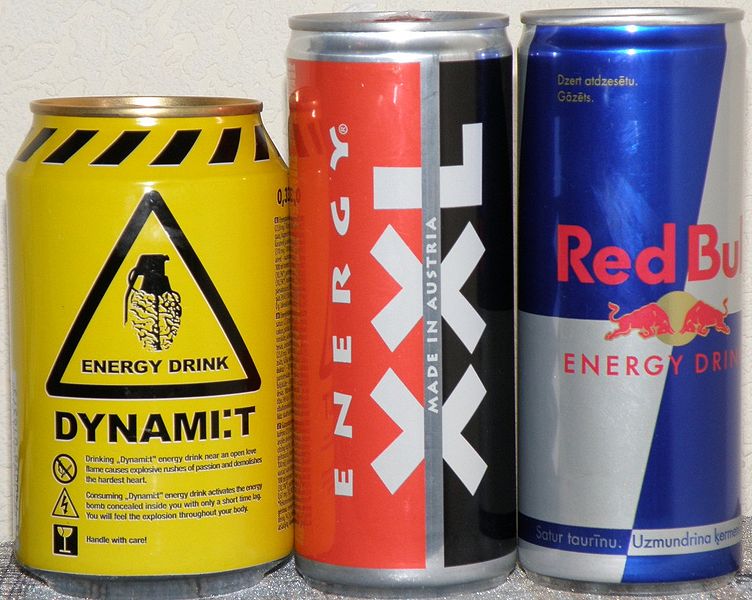Energy Drinks - A Closer Look
 Tuesday, May 18, 2010 at 08:38PM
Tuesday, May 18, 2010 at 08:38PM  One of our readers, Josh L., asked that I give him a little information about a popular product group that's generating billions of dollars in revenue every year - the energy drink. I told him I'd get on it, and made my first stop at the grocery store to take a look. The findings were interesting to say the least.
One of our readers, Josh L., asked that I give him a little information about a popular product group that's generating billions of dollars in revenue every year - the energy drink. I told him I'd get on it, and made my first stop at the grocery store to take a look. The findings were interesting to say the least.
Currently, there are approximately 150 different energy drinks on the market, so a product-by-product review is impossible (well, actually it would be way too time consuming). Instead, I'll stick to making some general observations based on some of the reading I've done.
Instant Energy
People buy energy drinks for a variety of reasons, but the most prevalent reason is, by far, sports performance. Athletes of all stripes, particularly teens, down beverages like Red Bull® and Amp® prior to and during training in order to enhance sports performance. They believe these products give them an edge that they couldn't otherwise get without the drink.
The sources of this energy are varied, but the main stimulant is caffeine. Take a look at some of the caffeine contents of popular sports drinks:
- Red Bull: 80 milligrams per 8.3-ounce serving
- Tab Energy: 95 mg per 10.5-oz serving
- Monster and Rockstar: 160 mg per 16-oz serving
- No Fear: 174 mg per 16-oz serving
- Fixx: 500 per 20-oz serving (Yikes!)
- Wired X505: 505 mg per 24-oz serving (Yikes, again!)
In comparison, according to Griffiths:
- Brewed coffee: 200 milligrams per 12-oz serving
- Instant coffee: 140 mg per 12-oz serving
- Brewed tea: 80 mg per 12-oz serving
- Mountain Dew: 54 mg per 12 oz. serving
- Dr. Pepper: 41 mg per 12-oz serving
- Pepsi Cola: 38 mg per 12-oz serving
- Coca-Cola Classic: 34.5 mg per 12-oz serving
- Canned or bottled tea: 20 mg per 12-oz serving
When you look at it, the caffeine content in energy drinks seems fairly consistent with brewed coffee. So what's the big deal? It's the junk you don't really pay attention to: other hidden stimulants that come with funky names like guarana, bitter orange, and synephrine. Considering there is no regulation from any governing agency as to how much of these substances can be put into energy drinks, the amount of actual consumed stimulant (caffeine + other stimulants) is unknown.
And don't forget - there is a LOT of sugar in energy drinks, adding to the energy boost that you get.
Energy drink manufacturers have talking heads who declare that their product is no more dangerous than a cup of coffee. I have to point out a couple of logical fallacies being employed by such statements.
First, most people do not slam a cup of coffee immediately before or during an intense workout. This is the primary use of energy drinks - athletes trying to gain an edge or energy boost during training. During training, athletes' heart rates are already accelerated. Consuming unknown quantities of metabolic stimulants prior to a workout can put additional, perhaps excessive, strain on the heart. In athletes with undiagnosed cardiac issues, the restult could be fatal. Further, in hot and humid climates the effect of the energy drink is compounded by the fact that caffeine interrupts the brain's ability to peceive pain and fatigue. This dulled perception in combination with hot humid conditions can lead to a higher risk of exertional heat stroke.
The second logical fallacy is that coffee takes time to consume. How many hot coffees can you down in a 3 minute time frame? Personally, I take about 15-20 minutes to take in my large fat-free latte with Sun Crystals sweetener. A cold energy drink can go down in a few seconds, and a good many people don't stop with just one. In researching this article, I came across the story of a 17-year-old high school basketball player who downed at least 7 (SEVEN!!) Red Bulls® between games in a basketball tournament. He collapsed, conveniently enough, in a hospital while visiting a relative.
The fact of the matter is simple: when you dump 400-500mg of caffeine, loads of other stimulants, overdoses of vitamin B complex, and a ton of sugar on your system in a matter of minutes, the body goes into a state of emergency. Symptoms include nausea, insomnia, nervousness, anxiety, rapid heartbeat and, occasionally, death. That's a heavy price to pay for a little bit of sports performance.
Other Associated Risks
Like the informercials say, "But wait! There's more!" With the amount of stimulant being consumed, there are bound to be multiple physiological effects. Here are a few to consider.
Caffeine is a diuretic - it promotes water depletion. People who consume stimulant rich beverages (including coffee) incidentally deplete their bodies of water. If you want to test this theory, here's an experiment: drink a couple bottles of water over the course of about 30 minutes. Wait a little while then down a can of soda. Feelings of urgency should begin shortly. Be prepared to beat a path to the bathroom door at least 4-5 times per hour.
Users of energy drinks should be consuming at least equal amounts of water. 8 oz of energy drink should be followed eventually with 8 oz of water. Failure to do so will make the resulting crash even more unpleasant, since a classic symptom of dehydration is fatigue.
Further, caffeine is technically a drug that comes with all the pains that drugs can bring. Withdrawal can be a very unpleasant experience with its resultant fatigue, headaches, and irritability. Those who continue to use energy drinks require more and more caffeine to reach satisfactory threshhold levels, furthering the addiction and making cessation of use more and more difficult.
Overall, research clearly indicates that adverse effects of high levels of caffeine outweigh the boosting effects of consuming levels such as those found in energy drinks. Unless you're a fan of such things as insomnia, gastrointestinal issues, fatigue, hypertension, and heart disease, keeping use of energy drinks in moderation is a must.
Summing it Up
Energy drinks do have the capacity to increase energy output for a short period of time. In that regard, they are true to their labels. However, it is important that the user be aware of multiple factors:
- Moderation, moderation, moderation. An occasional energy drink is acceptable, but frequent use (multiple servings per day) is not recommended.
- Drink water. Lots and lots of water. Since caffeine can aid in dehydrating the body, more water intake is necessary to offset water depletion.
- Those in hot and humid climates should not consume energy drinks prior to intense exercise. The possibility of exertional heat stroke is too real to be ignored. The body does not perceive the brain's warning signals, so the stroke can occur before the victim is aware.
- Avoid the energy drinks Fixx, WiredX505, and Cocaine, since they have 350% of the caffeine found in other energy drinks. For the mathematically challenged (like me), that's around 300mg/8oz serving. Bad, bad mojo there.
- Nothing boosts energy like being in good physical condition. Never forego regular exercise by thinking that energy in a can is a suitable replacement.
Be well!
 Keith |
Keith |  2 Comments |
2 Comments | 



Reader Comments (2)
nice topic you have shared dear..
Energy drinks are really healthy and good for health..
it never feels that you have do a lot of work.Get it and be fresh again....
I have organized my birthday party with my friends and i use lot of energy drinks and alcohol to celebrate.i was searching kids birthday party ideas now for my little brother..